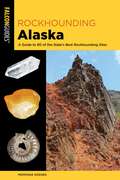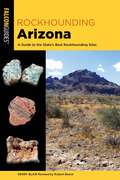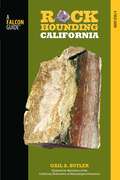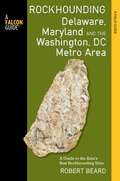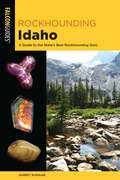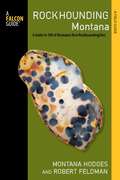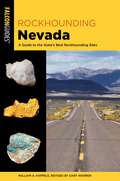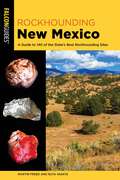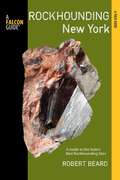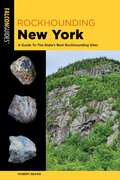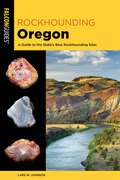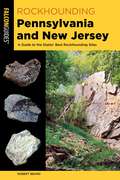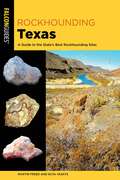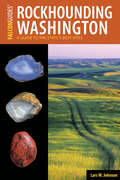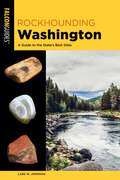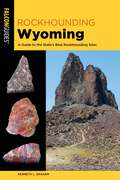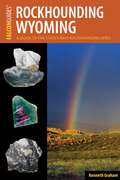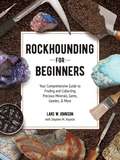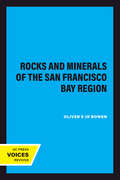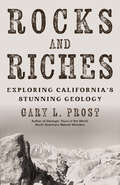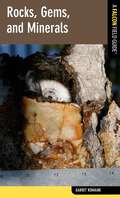- Table View
- List View
Rockhounding Alaska: A Guide to 80 of the State's Best Rockhounding Sites (Rockhounding Series)
by Montana HodgesA complete guide to finding, collecting, and preparing the state&’s gems and mineralsRockhounding Alaska is a must-have book for collecting rocks, minerals, and fossils in the Last Frontier. This guidebook features an overview of the state&’s geologic history as well as a site-by-site guide to seventy-five collecting locations that stretch from Kodiak Island to the Arctic Circle, with treasures ranging from ancient fossilized sea creatures to precious gems and gold nuggets.A complete and accurate guidebook to the state&’s vast riches, Rockhounding Alaska is the ideal resource for rockhounds of all ages and experience levels.Look inside to find:• Maps and detailed site descriptions with directions and GPS coordinates• Suggested tools and techniques• Land-use regulations and legal restrictions• Contact information for land managers• Additional information on rock shops, attractions, and local history
Rockhounding Arizona: A Guide to the State's Best Rockhounding Sites
by Gerry BlairExplore the mineral-rich region of Arizona with veteran rockhound Robert Beard&’s Rockhounding Arizona, 3rd Edition. Fully revised and updated, unearth treasures from the state&’s best rockhounding locations, ranging from popular and commercial sites to numerous lesser-known areas. Featuring an overview of the state&’s geologic history as well as site-by-site chapters, Rockhounding Arizona is the ideal resource for rock seekers and collectors of all ages and experience levels.
Rockhounding California: A Guide to the State's Best Rockhounding Sites (Rockhounding Series)
by Gail A. Butler Shep KossA complete guide and source-book brimming with advice on collecting and preparing gems and minerals .
Rockhounding Delaware, Maryland, and the Washington, DC Metro Area: A Guide to the Areas' Best Rockhounding Sites (Rockhounding Series)
by Robert BeardWith this informative guide, you can explore the mineral-rich areas' of Delaware, Maryland, and Washington D.C., from the beaches to the mountains. It describes the areas' best rockhounding sites and covers popular and commercial sites as well as numerous little-known areas. This handy guide also describes how to collect specimens, includes maps and directions to each site, and lists rockhound clubs. Rockhounding Delaware, Maryland, and Washington D.C. offers a complete introduction to this many-faceted hobby and is an invaluable sourcebook.
Rockhounding Idaho: A Guide to the State's Best Rockhounding Sites (Rockhounding Series)
by Garret RomaineA complete guide to finding, collecting, and preparing the state&’s gems & mineralsRockhounding Idaho is a must-have book for anyone interested in collecting rocks, minerals, fossils, and gold in the Gem State. Completely up-to-date with over 200 GPS coordinates in ninety-nine collecting locales, it covers popular and widely known fee-dig operations as well as four-wheel-drive adventures into the desert, and long winding drives through the mountains. The result is a complete and accurate guide to the state&’s vast riches.The author—a long-time field collector in the Pacific Northwest and an award-winning writer—clearly explains the broad outlines of Idaho&’s many collecting locales and mining districts, and provides an appreciation for the geology underneath. You can use this guide to plan expeditions straight across the state or to devise looping road trips that cover a single region in great detail. From agates to zeolites, from garnets to gold, Rockhounding Idaho is the ideal resource for rockhounds of all ages and experience levels. Look inside to find:• Maps and detailed site descriptions with directions• Suggested tools and techniques• Land-use regulations and legal restrictions• Information on nearby camping
Rockhounding Montana: A Guide to 100 of Montana's Best Rockhounding Sites (Rockhounding Series)
by Robert Feldman Montana HodgesWith this informative, fully updated and revised guide, you can explore the mineral-rich region of Montana. It describes the state's best rockhounding sites and covers popular and commerical sites as well as numerous little-known areas. This handy guide also descirbes how to collect specimens, includes maps and directions to each site, and lists rockhound clubs around the state. This is truly a complete guide to popular collecting sites in Montana and source-book brimming with advice that can be of use to both the novice and the experienced rockhounder.
Rockhounding Nevada: A Guide to The State's Best Rockhounding Sites (Rockhounding Series)
by William A. KappeleA complete guide and source-book brimming with advice on collecting and preparing gems and minerals.
Rockhounding New Mexico: A Guide to 140 of the State's Best Rockhounding Sites (Rockhounding Series)
by Martin Freed Ruta VaskysMore than a third of New Mexico is public land that holds untold quantities of mineralogical treasure. With this book anyone can learn where to find unusual mineral displays, fossils, jasper, agate, petrified wood—not to mention more obsidian than one rockhound could possibly collect in a lifetime. The array and quality of such materials just waiting to be found in New Mexico are almost mind-boggling.Rockhounding New Mexico describes 140 of the state's best rockhound sites, covering popular and commercial sites as well as numerous little-known areas. This handy guide describes where and how to collect specimens, includes maps of each site as well as directions, and provides reliable recommendations for accommodations, camping, and other special attractions. It is, in short, a complete and outstanding introduction to the many sides of a fascinating hobby.
Rockhounding New York: A Guide to the State's Best Rockhounding Sites (Rockhounding Series)
by Robert BeardA complete guide and source-book brimming with advice on collecting and preparing gems and minerals .
Rockhounding New York: A Guide to the State's Best Rockhounding Sites (Rockhounding Series)
by Robert BeardWith this informative guide, you can explore the mineral-rich state of New York, from the beaches to the mountains. It describes the states' best rockhounding sites and covers popular and commercial sites as well as numerous little-known areas. This handy guide also describes how to collect specimens, includes maps and directions to each site, and lists rockhound clubs in the state. Rockhounding New York offers a complete introduction to this many-faceted hobby and is an invaluable sourcebook.
Rockhounding Oregon: A Guide to the State's Best Rockhounding Sites (Rockhounding Series)
by Lars W. JohnsonFully revised and updated, this book provides detailed directions and GPS coordinates to the best rockhounding sites in Oregon, with valuable tips on what tools to bring and how to conduct your search. Comprehensive lists of minerals or fossils for each site and excellent color photos will help you know what to look for and to identify what you&’ve found. Information on clubs, rock shops, museums, and special attractions are provided. Rockhounding Oregon is a must-have for anyone interested in collecting their own minerals, gems, and fossils in the region.
Rockhounding Pennsylvania and New Jersey: A Guide to the States' Best Rockhounding Sites (Rockhounding Series)
by Robert BeardWith this informative guide, you can explore the mineral-rich regions of Pennsylvania and New Jersey, from the beaches to the mountains. It describes the states' best rockhounding sites and covers popular and commercial sites as well as numerous little-known areas. This handy guide also describes how to collect specimens, includes maps and directions to each site, and lists rockhound clubs in each state. Rockhounding Pennsylvania and New Jersey offers a complete introduction to this many-faceted hobby and is an invaluable sourcebook.
Rockhounding Pennsylvania and New Jersey: A Guide to the States' Best Rockhounding Sites (Rockhounding Series)
by Robert BeardA complete guide and source-book brimming with advice on collecting and preparing gems and minerals .
Rockhounding Texas: A Guide to the State's Best Rockhounding Sites (Rockhounding Series)
by Martin Freed Ruta VaskysRockhounding Texas is a complete guide to finding, collecting, and preparing Texas' gems & minerals. With this book anyone can learn where to find unusual mineral displays, fossils, jasper, agate, and petrified wood—not to mention more obsidian than one rockhound could possibly collect in a lifetime. An outstanding resource for experts and novices alike, Rockhounding Texas points the way to the state's best rockhounding sites, including popular and commercial areas as well as lesser-known sites on public land.Look inside to find:• Maps and detailed site descriptions with directions and GPS coordinates• Suggested tools and techniques• Land-use regulations and legal restrictions• Contact information for land managers• Additional information on rock shops, attractions, and local history
Rockhounding Utah: A Guide To The State's Best Rockhounding Sites (Rockhounding Series)
by William A. Kappele Gary WarrenThis completely updated and revised, full-color edition of Rockhounding Utah reveals the grandeur of the state's exposed formations, its canyon walls etched with fossils, and the spires and arches of the Needles District in Canyonlands National Park. Each description of the 86 state's sites includes concise information on the material to be found there, the tools to bring, the best season to visit, the vehicle to drive, or when a remote find suggests it's time to lace up the hiking boots. Readers will glean new insights into the obsidian of the Black Rock sites, jasper at Hell's Backbone, petrified wood at Bullfrog Turnoff, and fossils of sea lillies along the Wasatch Range.
Rockhounding Washington: A Guide to the State's Best Sites (Rockhounding Series)
by Lars W. JohnsonThis book provides detailed directions and GPS coordinates to the best rockhounding sites in Washington, with valuable tips on what to tools to bring and how to conduct your search. Comprehensive lists of minerals or fossils for each site and excellent color photos will help you know what to look for and to identify what you&’ve found. Information on clubs, rock shops, museums, and special attractions are provided. Rockhounding Washington is a must-have for anyone interested in collecting their own minerals, gems, and fossils in the region.
Rockhounding Washington: A Guide to the State's Best Sites (Rockhounding Series)
by Lars W. JohnsonRevised and updated this guide provides detailed directions and GPS coordinates to the best rockhounding sites in Washington, with valuable tips on what to tools to bring and how to conduct your search. Comprehensive lists of minerals or fossils for each site and excellent color photos will help you know what to look for and to identify what you&’ve found. Information on clubs, rock shops, museums, and special attractions are provided. Rockhounding Washington is a must-have for anyone interested in collecting their own minerals, gems, and fossils in the region.
Rockhounding Wyoming: A Guide to the State's Best Rockhounding Sites
by Kenneth L. GrahamThe 75 sites described in this guide take you across the red desert to the high mountain majesty of the Big Horns and Wind Rivers as well as the geologic wonders of Yellowstone National Park. Graham, a former hardrock miner, developed an interest in rocks at an early age, and he shares his enthusiasm for rockhounding and his appreciation for the diverse Wyoming landscape that holds the treasure. Each description provides detailed information complete with maps on how to find the remote as well as popular digs, what will likely be found there, the tools to bring, the best season to visit, the appropriate vehicle to drive, or when to lace up your hiking boots to get to those out-of-the-way places.
Rockhounding Wyoming: A Guide to the State's Best Rockhounding Sites
by Kenneth L. GrahamThe 75 sites described in this guide take you across the red desert to the high mountain majesty of the Big Horns and Wind Rivers as well as the geologic wonders of Yellowstone National Park. Graham, a former hardrock miner, developed an interest in rocks at an early age, and he shares his enthusiasm for rockhounding and his appreciation for the diverse Wyoming landscape that holds the treasure. Each description provides detailed information complete with maps on how to find the remote as well as popular digs, what will likely be found there, the tools to bring, the best season to visit, the appropriate vehicle to drive, or when to lace up your hiking boots to get to those out-of-the-way places.
Rockhounding for Beginners: Your Comprehensive Guide to Finding and Collecting Precious Minerals, Gems, Geodes, & More
by Lars W. Johnson Stephen M. VoynickGo on an outdoor treasure hunt and enjoy all nature has to offer with this field guide to rockhounding, perfect for armchair geologists or anyone headed out on an adventure!Geology meets treasure hunting with this field guide to rockhounding! If you&’ve ever kept an interesting rock or shell, bought a polished stone from a gift shop, or even just enjoyed a &’gram of a really cool crystal, congratulations! You&’ve already experienced a rockhounding adventure! Rockhouding for Beginners shows you how to take your rockhounding to the next level, providing everything you need to know from tips for finding local sources for really cool finds to techniques for safely cleaning, cutting, polishing, and caring for the best samples. Complete with full-color photos to help you identify each rock and mineral wherever you find them, this guide has all the rockhounding information you need whether you&’re ready to get down and dirty or simply want to learn more from the comfort of your couch.
Rocks and Minerals of the San Francisco Bay Region (California Natural History Guides #5)
by Oliver E BowenThis title is part of UC Press's Voices Revived program, which commemorates University of California Press’s mission to seek out and cultivate the brightest minds and give them voice, reach, and impact. Drawing on a backlist dating to 1893, Voices Revived makes high-quality, peer-reviewed scholarship accessible once again using print-on-demand technology. This title was originally published in 1962.This title is part of UC Press's Voices Revived program, which commemorates University of California Press’s mission to seek out and cultivate the brightest minds and give them voice, reach, and impact. Drawing on a backlist dating to 1893, Voices Revived</DIV
Rocks and Riches: Exploring California’s Stunning Geology
by Gary L. ProstTake a road trip through deep time and California history, with a friendly expert geologist at the wheel.From its epic earthquakes to its famed epithet "the Golden State," California as we know it would not exist without geology. Gary L. Prost, an expert geologist born and raised in California, embarked on a quest to better understand the state's rocky history. His road trips have culminated in Rocks and Riches, an accessible and entertaining look at the land that has shaped the lives of all Californians. With humor and abiding curiosity, Prost examines the workings of deep time, the fascinating and troubled legacies of the Gold Rush, and the ways geology continues to influence life in California today. Visiting 56 stops of geologic interest, he traverses the Marin and Sonoma coasts, the Central Valley, the Sierra Foothills, Yosemite, and the Basin and Range country, ending with an extended journey through Death Valley to meditate on the awe-inspiring intensity of California's deserts. Including dozens of illustrations and road maps, as well as guidance for fellow travelers, Rocks and Riches is both a practical handbook and an invitation to see California's landscapes with wonder.
Rocks, Gems, and Minerals (Falcon Field Guide Series)
by Garret RomaineRocks, Gems, and Minerals is a field guide to 80 of the most common and sought-after rocks, gems, and minerals hidden throughout North America. Conveniently sized to fit in your pocket and featuring full-color, detailed photographs, this informative guide makes it easy to identify rocks in your backyard and beyond. Also included is an introduction that covers fundamental geology information and interesting facts. This is the essential source when you're out in the field, both informative and beautiful to peruse.
Rocks, Gems, and Minerals (Falcon Pocket Guides)
by Garret RomaineRocks, Gems, and Minerals is a field guide to more than 100 of the most common and sought-after rocks, gems, and minerals hidden throughout North America. Conveniently sized to fit in your pocket and featuring full-color, detailed photographs, this informative guide makes it easy to identify rocks in your backyard and beyond. Also included is an introduction that covers fundamental geology information and interesting facts. This is the essential source when you're out in the field, both informative and beautiful to peruse.
Rocks, Gems, and Minerals of the Rocky Mountains (Falcon Pocket Guides)
by Garret RomaineRocks, Gems, and Minerals of the Rocky Mountains is a field guide to more than 130 of the most common and sought-after rocks, gems, and minerals hidden throughout the Rocky Mountains. Conveniently sized to fit in your pocket and featuring full-color, detailed photographs, this informative guide makes it easy to identify rocks in your backyard and beyond. Also included is an introduction that covers fundamental geology information and interesting facts. This is the essential source when you're out in the field, both informative and beautiful to peruse.
